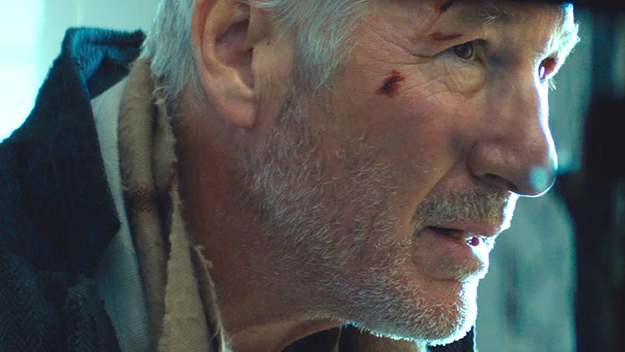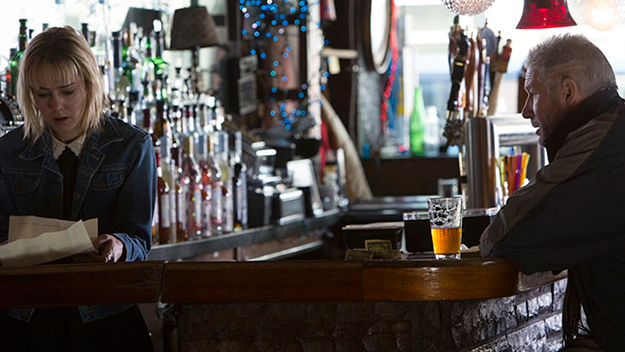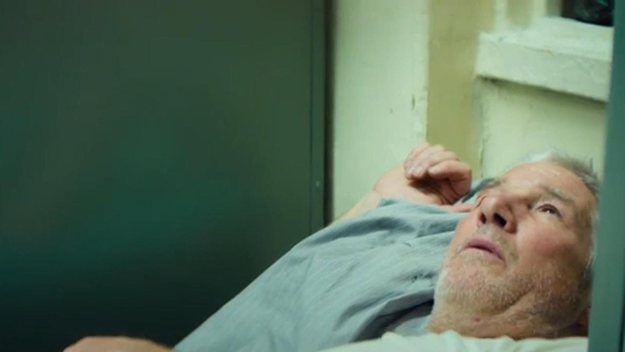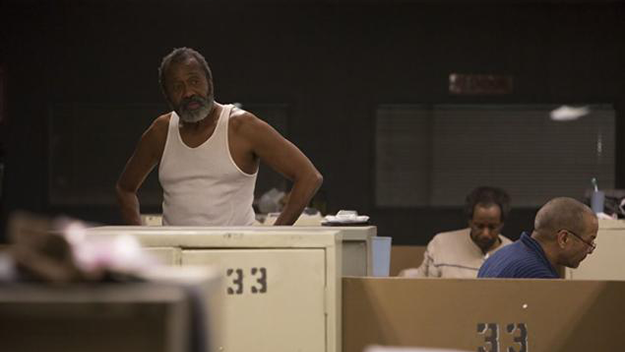Deep Focus: Time Out of Mind

During a marvelous interlude about a fourth of the way through Oren Moverman’s Time Out of Mind, Richard Gere’s bereft and confused homeless man rediscovers his flirtation reflexes while talking to a nurse (Geraldine Hughes) in a hospital waiting room. Noting her gentle brogue and pert Gaelic features, Gere’s character, George, suddenly leans into her. He flicks his eyes onto their high beams as he tells her that his grandmother on his mother’s side was Irish. Before long, he hints that he’d like to crash at her place. When she gently declines, it signals to him (and to the audience) that he’s tumbled into a lower level of helplessness. Soon he follows her advice and enters the homeless shelter system.
Time Out of Mind, a maddening, sporadically affecting film, explores what the “invisibility” of the homeless means to the mass of secure New Yorkers and to people like George, who’s in denial because he instinctively understands that “homelessness” is not just a danger but a stigma. Moverman strives to be inventive when capturing George’s fragile, perilous existential state. Using an intricate audiovisual strategy, Moverman, who wrote as well as directed, shoots George as if the camera were a passerby stuck at a stoplight or a stranger peering through a grated window or a doorway—someone who doesn’t care about him. At the same time the director drops George into a dense and often assaultive audioscape that attacks his brain with confounding signals, especially when he’s trying to stay anchored to some vestige of an identity. The sound track is filled with echoes of overheard conversation and music as well as urban clamor, while the images are refracted through or reflected in pieces of glass or polished surfaces. In the midst of this aural and ocular cacophony, Moverman guides his camera in close enough to record George’s intimate emotions and faint stirrings of thought.
In a way, it’s a prodigious feat. “We shot the movie on three lenses that we had to import from Germany,” Moverman told Anne Thompson. “They’re basically anamorphic zoom lenses that are hardly ever used. The whole idea was for us to be removed from the process of throwing Richard into the real world and capturing it from far away.” Moverman was not merely being auteurish. He wanted to evoke the way most people in the movie’s audience ignore the homeless in the streets, and to get them thinking: “If this could happen to Richard Gere . . . it could happen to all of us.”

Moverman, who wrote and directed The Messenger (09) and Rampart (11) and co-wrote the scripts for I’m Not There (07) and Love & Mercy (14), has always been an adventurous and innovative filmmaker. When his bets pay off, as they did in Love & Mercy, he can translate bleak material into drama that’s illuminating and sometimes elating. Telling the story of Beach Boys genius Brian Wilson on a double track—one following the young Wilson (Paul Dano) as he experiences artistic highs and nervous breakdowns while composing and recording Pet Sounds, the other charting the older Wilson (John Cusack) as he stumbles back into sanity—enables the actors to grab hold of an audience’s imagination. Dano and Cusack fill viewers with apprehension, anticipation, and wonder at the mysteries of creativity and the intricacies of psychology. (The movie was one of this summer’s biggest independent hits.)
In Time Out of Mind, though, Moverman’s experiments are wearying—they deplete your emotions rather than rouse your empathy. You feel spent before the film is halfway over. For the most part, the auteur’s visual strategy just pounds home the protagonist’s disconnectedness and deterioration. At first George resembles an executive who’s been beaten up during a bar fight. In the opening minutes a building manager (Steve Buscemi) rousts him from an apartment where he’s sleeping in the bathtub. He’s sufficiently in control to stammer out the semi-plausible explanation that he’s waiting for someone named Sheila (who might actually have lived there and been evicted). George soon goes downhill, getting pelted with his own shoes by sadistic tricksters while sleeping on a bench. He ditches his wheeled tote, sells his overcoat, grows sloppier; his one near-constant piece of clothing is his watch cap. He can’t understand why a lone woman, off camera, grows nervous at the sight of him lounging drunkenly on the floor of a bank foyer while she fiddles with an ATM. Ever the formalist, Moverman stays fixed on George as the woman panics on her cell phone as he offers assistance.
Moverman does generate a frisson or two when we realize that pedestrians unaware of the camera are simply bustling past Gere without recognizing him, as George cadges money or takes a swig of beer or, at his nadir, urinates off a curb. Those sensations are fleeting. Time Out of Mind is like a patchwork quilt left in patches. The story, which comes out in bits and pieces, is about George’s obsession with a hip barmaid named Maggie (Jena Malone) who is revealed to be his daughter. Gere and Malone conjure pent-up emotions, but they can’t travel beyond the boundaries of a script in which a wildly unreliable man insists on his fatherly bond to a daughter who can’t summon the wherewithal to support him. (In the course of the movie George discloses that he lost his job and benefits and couldn’t pull out of his tailspin after his wife died, leaving his daughter to live with grandparents at age 12.) The movie’s actors fare better when there’s less expectation of a payoff. Under Moverman’s guidance, they bring their own humanity to what might have been soul-free exchanges, like the moment of communion between George and that Irish nurse.

The movie develops a grinding sort of fascination when George enters the system at the 30th Street Men’s Intake Shelter at what used to be the Bellevue Psychiatric Hospital. The film salutes this safety net as a last resort, but it also laments practices and attitudes that make the homeless feel partly like children and partly like convicts, notably the threat of being tossed into a stricter shelter for rule-breaking as trivial as talking to yourself after lights-out. George’s haphazard memory and insistence on his dignity and rights make him an ideal figure for dramatizing the insanity of dangling assistance before people who need guidance to acquire basic social building blocks, like birth certificates and Social Security numbers. This part of the film testifies to the importance of aid organizations like the Coalition for the Homeless.
Gere interacts with a variety of well-intentioned characters in and out of the shelter, all played by actors on fire. Because of them the movie often works in spite of its visual artistry. In one striking scene, a cheerful, unflappable social worker (Tonye Patano) tries to cajole George into answering questions so she can provide him with food stamps. She calls him “handsome” and is cool enough to swing with it when he calls the aforementioned Sheila a “cow.” These performers are so talented that they convey every painful misstep in their repartee. But Moverman’s choice to shoot this conversation through a window registers as an affectation. You want him to smash the glass and let in the air and enable these great actors to climb through the window and get out of the script.
Jeremy Strong is unnerving as a wised-up shelter resident. He calibrates his performance perfectly, coming on as a pushy know-it-all but acting only as aggressively as the guards will allow. Kyra Sedgwick crackles with street smarts as a bag-lady whose frankness and canniness turn George on and lure him out of the shelter for a night. He awakens to the clicks of smartphones as schoolboys record him sleeping on cardboard in his underwear.

The character who comes closest to unearthing George’s core is Ben Vereen’s profoundly moving Dix, a motormouth who says he has George’s back—the Lord’s Prayer is tattooed in Aramaic on Dix’s back—and tries to teach his new friend everything he knows about surviving within the system. He says that he was a gifted jazzman. George turns out to be the one who can play jazz piano, but Vereen imbues Dix’s rhythmic patter with so much fellow feeling you believe that he can crash through his pal’s wariness. Dix has made his separate peace with being jobless and homeless. He brings improvisational exuberance to his begging as he seeks change from all kinds of New Yorkers. (At one point he sings a Jewish hymn, in Hebrew.) When George, in despair, tells Dix that people think of him as a cartoon, he responds, with a wonderful wave of his hands: “At least I’m animated.” Vereen expands his role into tragic dimensions. When his compulsive talking spirals out of control, is it because of his passionate commitment to George? It’s a question that might haunt his buddy—though, given George’s fractured mental state, the questions will linger only for a while.
Gere does all he can to flesh out Moverman’s concepts. He deploys everything that made him a movie star to characterize a man who has faded into the noisy, oppressive background. It’s a masterstroke for Moverman to insinuate that George was a charmer and a sponger to a string of women. A couple of times, George cuts through his fog and flashes his old seductive charm, so Gere can suggest the previous life of this now defeated individual. Gere transforms the slippery expressions and gestures of his slicker characters into rough, tense embodiments of disorder here. He captures all of George’s fear, doubt, and throttled rage as he strains to emerge from mental chaos. But the movie never makes the imaginative leaps that would put us in George’s battered shoes.
When you watch wonderful movies about doomed heroes or antiheroes, like Vittorio De Sica’s Umberto D or Carol Reed’s Odd Man Out, you never think, “This is depressing,” because you’re too caught up in the characters’ struggles and the unexpected beauties and epiphanies the directors discover in their shattered worlds. For all its sterling intentions, Time Out of Mind lacks that kind of electric compassion and transcendence. It shuts you out by distancing and aestheticizing the material. So most of the time, it’s just depressing.




